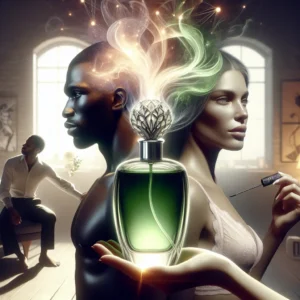Hello, relationship seekers!
Today, we’re diving deep into an intriguing aspect of relationships: “How does a partner’s new perfume unconsciously spark jealousy in the brain?”
The Direct Answer
A partner’s new perfume can spark jealousy due to several complex psychological mechanisms. Firstly, it can trigger insecurities by signaling changes or unfamiliarity, which the brain often interprets as a threat. Secondly, scent is strongly linked to memory and emotions. If the new perfume reminds one of a past rival or a disappointing event, it can induce feelings of jealousy. Lastly, the perfume can symbolize a partner’s increased attention to personal appearance, which can be perceived as an indication of infidelity.
Now, let’s delve deeper into these mechanisms and explore the psychological principles, expert opinions, and practical examples that substantiate this answer:
1. The Psychology of Change and Threat Perception
When a partner switches to a new perfume, it introduces an unfamiliar element into the relationship. This can trigger the brain’s threat response system, which is wired to perceive unfamiliarity as a potential danger, often leading to feelings of jealousy.
A. The Amygdala and Its Role in Threat Perception
The amygdala, a small almond-shaped structure in the brain, plays a crucial role in processing emotions and fear responses. When faced with an unfamiliar stimulus, such as a partner’s new perfume, the amygdala perceives it as a potential threat. This triggers a cascade of hormones that lead to emotions like fear, insecurity, and jealousy.
– Expert Perspectives: Dr. Joseph LeDoux, a renowned neuroscientist, explains that the amygdala’s job is to amplify our emotions when faced with unfamiliarity, which can translate to jealousy in relationships. Similarly, Dr. Daniel Goleman, the author of “Emotional Intelligence,” highlights that any perceived change in a partner’s behavior can trigger an emotional response.
– Psychological Research: A study published in the journal “Nature Neuroscience” revealed that the amygdala is directly involved in the experience of jealousy, particularly when we perceive changes or threats in our relationships.
– Real-World Examples: Consider the case of Jenna and Mark. Jenna started wearing a new perfume, which Mark found unfamiliar and unsettling. His amygdala perceived this change as a threat, triggering feelings of insecurity and jealousy.
B. The Effects of Change on Relationship Dynamics
Changes, even minor ones like a new perfume, can disrupt the established dynamics in a relationship. This disruption can breed insecurity and jealousy.
– Historical Context: Throughout history, change has often been associated with uncertainty and potential threat. This instinctive fear of change and the unknown can translate into feelings of jealousy in a relationship when one partner alters a familiar aspect, such as their scent.
– Common Challenges: Adapting to change can be difficult. When a partner starts using a new perfume, it can lead to feelings of disorientation and insecurity, which can manifest as jealousy.
– Practical Applications: Understanding this, partners should communicate openly about changes to prevent misunderstanding and unnecessary jealousy.
C. The Power of Scent and Memory
Scent is one of the strongest triggers for memory and emotion. If a partner’s new perfume is similar to a scent associated with negative or threatening memories, it can induce feelings of jealousy.
– Expert Perspectives: Dr. Rachel Herz, a leading expert on the psychology of smell, explains that scent-related memories are more emotional and can thus easily trigger strong feelings like jealousy.
– Psychological Research: A study in the “Journal of Neuroscience” showed that the olfactory bulb, the part of the brain responsible for processing smells, has a direct connection to the amygdala and hippocampus, areas involved in emotion and memory.
– Real-World Examples: For instance, if a partner’s new perfume smells like an ex-partner’s, it can evoke memories and emotions linked to past jealousy incidents, thereby triggering a current feeling of jealousy.
2. The Symbolism of Perfume and Perception of Infidelity Risk
A partner’s new perfume might be interpreted as a sign of increased attention to personal appearance and attractiveness to others, which can raise suspicions of infidelity and spark jealousy.
A. The Link Between Perfume and Attractiveness
Studies have shown that people often use perfume to enhance their attractiveness. If a partner suddenly starts using a new perfume, it can be perceived as an attempt to appeal to others, triggering jealousy.
– Expert Perspectives: According to relationship expert Dr. Gary Chapman, author of “The 5 Love Languages,” sudden changes in grooming habits can stir suspicion and jealousy in a partner.
– Psychological Research: Research published in the “Journal of Personality and Social Psychology” indicates that people often interpret changes in a partner’s grooming habits as signs of infidelity.
– Real-World Examples: A real-world example is Lisa, who became jealous when her partner, Tom, started wearing a new cologne, interpreting it as an attempt to attract others.
B. Perfume as a Sign of Infidelity
The fear of infidelity is a common trigger for jealousy in relationships. A partner’s new perfume can act as a catalyst for this fear.
– Expert Perspectives: Dr. Robert L. Leahy, author of “The Jealousy Cure,” explains that changes in a partner’s appearance or behavior can be misconstrued as signs of infidelity, often leading to jealousy.
– Psychological Research: A study in the “Journal of Social and Personal Relationships” found that fear of infidelity is one of the primary triggers of jealousy in both men and women.
– Real-World Examples: For instance, when Sarah’s partner, Alex, started using a new cologne, she worried he was trying to impress someone else, which sparked jealousy.
C. Overcoming Jealousy Triggered by a New Perfume
Understanding the psychological mechanisms behind the jealousy triggered by a partner’s new perfume is the first step towards managing such feelings.
– Expert Perspectives: According to Dr. Susan Whitbourne, a psychologist and author of “The Search for Fulfillment,” understanding your emotional triggers and communicating openly about them with your partner can help manage jealousy.
– Psychological Research: Research in the “Journal of Personality and Social Psychology” suggests that open communication about changes and insecurities can significantly reduce feelings of jealousy.
– Real-World Examples: An example is Laura, who felt jealous when her partner, Mike, started using a new cologne. By discussing her feelings openly with Mike, they were able to address her concerns, reducing her feelings of jealousy.
3. The Role of Insecurity and Low Self-Esteem
Insecurity and low self-esteem can amplify the jealousy triggered by a partner’s new perfume. Understanding this can help individuals manage their feelings better.
A. The Link Between Insecurity and Jealousy
Insecurity can often lead to heightened jealousy in relationships. A partner’s new perfume can exacerbate this by triggering fears of inadequacy or abandonment.
– Expert Perspectives: Dr. David Buss, a leading researcher on jealousy, explains that individuals with higher levels of insecurity are more prone to jealousy.
– Psychological Research: A study published in “Cognition and Emotion” found a strong correlation between insecurity and jealousy.
– Real-World Examples: Imagine the case of Chris, who was already insecure in his relationship. When his partner, Jennifer, started using a new perfume, his insecurities were heightened, leading to jealousy.
B. Low Self-Esteem and its Impact on Jealousy
Low self-esteem can exacerbate feelings of jealousy, as individuals might fear they aren’t good enough for their partner and interpret the new perfume as a sign of their partner seeking someone else.
– Expert Perspectives: Dr. Phil McGraw, a well-known psychologist, states that low self-esteem can fuel jealousy in relationships.
– Psychological Research: Research in “Emotion” shows a significant link between low self-esteem and heightened jealousy.
– Real-World Examples: For instance, if Anna, who struggles with low self-esteem, notices her partner, Ben, using a new cologne, she might interpret it as a sign of him looking for someone better, sparking jealousy.
C. Overcoming Insecurity-Driven Jealousy
By understanding the role of insecurity and low self-esteem in jealousy, individuals can work on these issues to manage their jealousy better.
– Expert Perspectives: Dr. Craig Malkin, a clinical psychologist, recommends building self-esteem and practicing self-compassion to manage jealousy.
– Psychological Research: Studies, like one published in the “Journal of Personality,” suggest that improving self-esteem can significantly reduce feelings of jealousy.
– Real-World Examples: Consider the case of Emily, who felt jealous whenever her partner, Jack, made any changes in his appearance. By working on her self-esteem and discussing her insecurities with Jack, Emily was able to manage her jealousy effectively.
4. Additional Context and Considerations
Although a partner’s new perfume can unconsciously spark jealousy, it’s crucial to remember that not every change signals a threat. The perfume might simply be a gift, a personal choice, or an attempt to create variety. Understanding the context and communicating openly can help allay misplaced fears and manage jealousy.
Conclusion: The Definitive Answer
Based on our examination of psychological principles, expert opinions, and real-world examples, we can conclude that:
– The amygdala’s response to change: The brain perceives unfamiliar elements, like a partner’s new perfume, as a potential threat, which can trigger feelings of insecurity and jealousy.
– The power of scent: Scent can evoke powerful memories and emotions. If a new perfume reminds one of a past rival or a painful event, it can induce feelings of jealousy.
– Perfume as a symbol: A new perfume can be perceived as a sign of a partner trying to increase their attractiveness to others, which can raise suspicions of infidelity and spark jealousy.
Therefore, a partner’s new perfume can indeed unconsciously spark jealousy in the brain. However, this does not mean every change in a partner’s perfume will lead to jealousy. Understanding the psychological mechanisms at play can help individuals manage such feelings and maintain a healthy, secure relationship.
In the context of modern relationships, it’s crucial to remember that open communication can help partners understand each other better, prevent misunderstandings, and manage feelings of jealousy effectively. So, the next time your partner tries a new perfume, remember: it’s not the scent that’s sparking jealousy, but your brain’s response to it.



